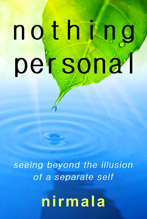Living Life as a Question
Living Life as a Question

 (Excerpt from the book, Nothing Personal, Seeing Beyond the Illusion of a Separate Self .)
(Excerpt from the book, Nothing Personal, Seeing Beyond the Illusion of a Separate Self .)
Many of the questions and concerns in the satsangs or spiritual gatherings I lead come in a similar form: How do I get or keep a particular experience? How do I get or keep a sense of awakeness or expansion or openness or freedom or loving kindness or Presence? Or if worldly concerns are the issue, the question is the same: How do I get or keep more health, more wealth, more comfort, more security, more romance? Another form these questions take is: How do I avoid falling asleep or feeling stuck or being contracted or being sick or losing love? They’re good questions. There’s nothing wrong with them. They’re real for the person who’s asking them.
Within each of these questions is the assumption that you need to do something-you need to get or keep or avoid something. Right there, in that assumption, is our suffering. The effort to get or keep or avoid any experience is what makes life miserable, difficult, dis-easeful.
In satsang, another possibility is pointed to, a way of touching your experience without either trying to hold on to it or push it away. It's a way of reaching out to your experience and really seeing what's it's like. In doing this, the questions become: How open or stuck am I right now? How open or closed is my Heart right now? How happy or sad am I right now?
And when the answer comes, the question becomes, What's that like? What's it like to be expanded or contracted or whatever it is you are experiencing? What's it like to have an open Heart or to not be in touch with your Heart at all in a particular moment? What's it like to be filled with love? What's it like to feel a lack of love? This is reaching out and touching the experience as it is and also as it changes naturally. It's not a static question, but an alive one; you're never done with that question because your experience is always changing.
In doing this, rather than trying to change life, you're living life as a question. What's this like? And what's it like now that I've noticed what this is like? And what's it like now? And now that it's changed again, what's it like? Even your noticing something changes it, so by the time you've found an answer, it's time to ask the question again.
We've been so conditioned to think that the point of questions is to get answers that we overlook that the point of answers is that they get us to more questions. The questions are as valid and rich as any answer because every answer is full of questions. You can even begin to enjoy the questions, even trust the questions, as much as any answer that comes.
When you value the questions themselves, you just naturally hold the answers more lightly because they aren't the goal. If the question is just as rich as the answer, then it's fine if the answer comes and goes. Have you ever noticed that you've forgotten everything you once understood? Every insight you've ever had has faded, and that's great because then you're back in the question. You're back in this really alive place where you're getting to find out what you know now, what's happening now, what's moving, what's changing, what it's like now. What is it like now? You'll never be done with that question. What's happening now? You could say that answers are just a temporary side effect of having questions.
This is a gentler, more respectful way of being with your experience. It's a more intimate way of being with your experience every moment to ask what it's like instead of How can I fix it? How can I get more? How can I get less? How can I improve it? How can I change it? How can I avoid it? How can I hang onto it? Do you see how all of these questions have an effort to them? They have a sense of violence to them-a sense of being in battle with or in opposition to your life. It's hard to be intimate with someone when you're pushing them out the door or trying to keep them from leaving. There's no intimacy in that kind of interaction. How much possibility is there for real, deep contact? The same thing is true for other aspects of our experience. It is possible to intimately experience the expansions and contractions, the openings and the closings, the freedom and the stuckness, the wonder and the confusion, the understanding and the lack of understanding.
So, what experience is moving in you right now? No matter what that is, that's the place to start because that's what's moving in you right now. If a desire is moving in you right now, what's it like to want something? Or if it's a fear, what's it like to fear something? There are no wrong questions; they're all entry points, places where this inquiry can open up and become soft and intimate. So, what's it like right now?






















